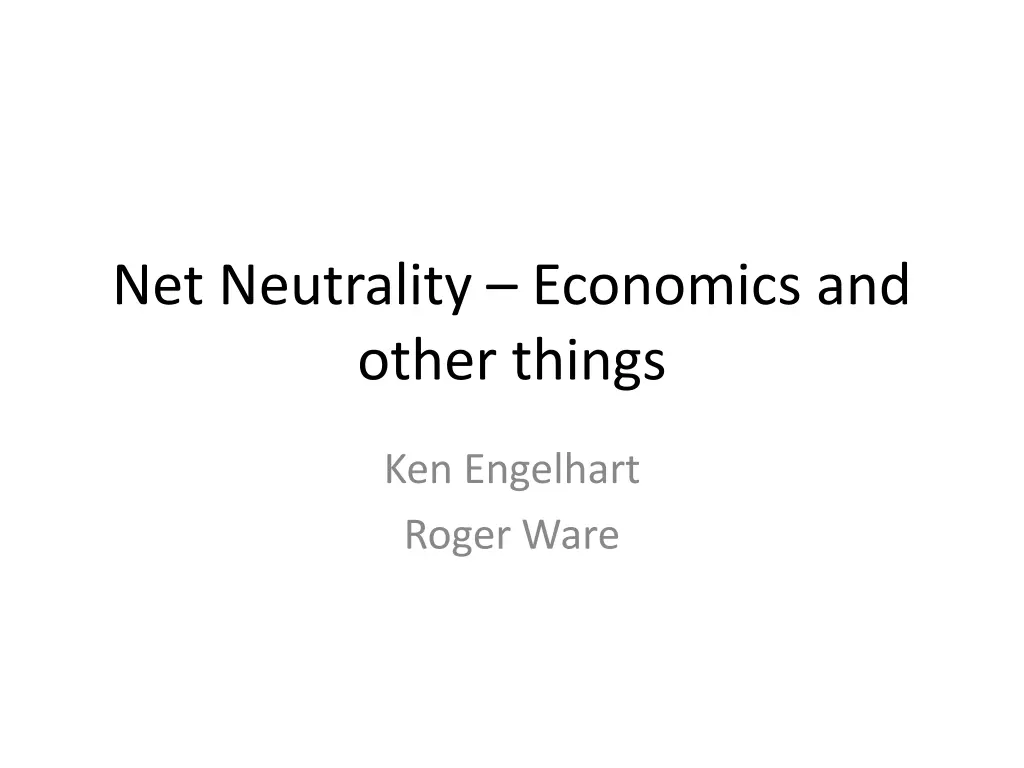
Understanding Net Neutrality: Key Insights
Explore the concept of net neutrality, its origins, importance, and potential impact on Internet freedom. Learn about the principles behind net neutrality and why it is crucial in maintaining an open and fair digital environment. Discover the arguments surrounding the debate, the commercial aspects, and why certain concerns about ISPs profiting from websites have not materialized.
Download Presentation

Please find below an Image/Link to download the presentation.
The content on the website is provided AS IS for your information and personal use only. It may not be sold, licensed, or shared on other websites without obtaining consent from the author. If you encounter any issues during the download, it is possible that the publisher has removed the file from their server.
You are allowed to download the files provided on this website for personal or commercial use, subject to the condition that they are used lawfully. All files are the property of their respective owners.
The content on the website is provided AS IS for your information and personal use only. It may not be sold, licensed, or shared on other websites without obtaining consent from the author.
E N D
Presentation Transcript
Net Neutrality Economics and other things Ken Engelhart Roger Ware
Origins of the internet and the different dimensions of net neutrality economic, political innovation, geeky Definition: Net neutrality: The principle that all data traveling through information networks to consumers should be treated equally. Practices that violate the principle include throttling of data to collect payment, discrimination among users or types of data, or paid promotion to ensure faster delivery.
A more radicalized approach (from savetheinternet.com - an activist website) What is Net Neutrality? Net Neutrality is the internet s guiding principle: It preserves our right to communicate freely online. Net Neutrality means an internet that enables and protects free speech. It that ISPs should provide us with open networks and shouldn t block or discriminate against any applications or content that ride over those networks. Just as your phone company shouldn t decide who you call and what you say on that call, your ISP shouldn t interfere with the content you view or post online. Without Net Neutrality, cable and phone companies could carve the internet into fast and slow lanes. An ISP could slow down its competitors content or block political opinions it disagreed with. ISPs could charge extra fees to the few content companies that could afford to pay for preferential treatment relegating everyone else to a slower tier of service. This would destroy the open internet. means
The vertical structure of the internet and where net neutrality enters
Commercial broadband started in 1995 and the term net neutrality was coined in 2003 The concern is that ISPs will charge websites for access to their networks and networks that do not pay will be slowed down or blocked this has never happened. The ISPs have admitted that they want to do it.
Why it will never happen: - ISPs are already very profitable The important websites would never pay. The ISPs that didn t block would get all the business How do you have a slow lane when the customer buys an average speed?
weird things have happened but no ISP has ever charged a website Madison River - TELUS union - AT&T Facetime - Netflix peering points
If the regulations dont matter, why not have them just to be safe? zero rating Facebook Free Basics
Canada has the strictest net neutrality rules in the world and the US will soon have only guidelines. How will the Internet be different in Canada and the US?
Two sided markets and Net Neutrality Content providers pay a negative price (or zero price) for access to customers. Two possible departures from zero price (net neutrality).A fee to all application and content providers. A differential fee structure to content providers, e.g. fast access and slow access . Brief summary of what a two sided market is and examples How prices are set and whether there is a role for regulator
Other dimensions Net neutrality and investment incentives. Allowing ISPs to discriminate over content users leads to greater investment in bandwidth. Canadian context, CRTC 2017 decision on zero rating . Political economy and rent seeking.
